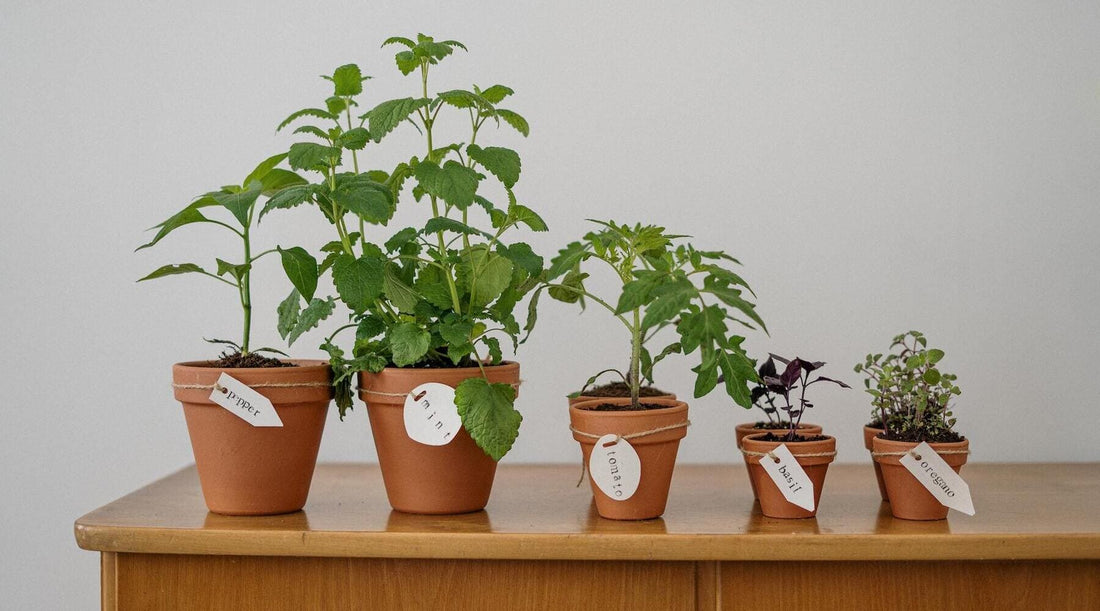Are you up for a new challenge or looking for ways to reduce plastic waste within your home? Then starting your own indoor sustainable garden could be perfect for you! Keeping a garden alive and thriving indoors can seem daunting at first but don’t lose hope. Especially since there are so many reasons why growing your own indoor garden can be beneficial for your home and lifestyle.
Here are six benefits of growing an indoor garden that you should know.
Food tastes better
Growing fresh fruit, vegetables and herbs in your home is a fantastic way to refresh your taste buds. Food and herbs grown on a farm, packaged and transported to a supermarket have lost part of their flavour throughout the process. Studies show that imported food may look appealing but can lose vitamin and mineral contents, creating lacklustre-tasting meals. By growing your own indoor garden, you can cook food with freshly grown ingredients that heighten the taste of your meals.
Reduce plastic waste in the kitchen
When you think about it, the vast majority of food items we bring into our kitchen are packaged in plastic, contributing massively to plastic waste. A report from Wrap claims that removing plastic packaging from fruit and vegetables in supermarkets could save more than 10,300 tonnes of plastic and 130,000 tonnes of CO2e.
Instead of waiting for supermarkets to change, you can start to grow your own produce at home, which means buying less from supermarkets and lowering your plastic waste in the kitchen. This way, you are doing two great things at once: reducing plastic waste and growing fresh fruit, vegetables and herbs to enjoy whenever you like.
Gain a new hobby
Plus, it’s never too late to learn a new hobby! Learning how to grow your own indoor garden can be a great educational experience, which you can pass on to your children if you have your own family. It’s a great hands-on experience and a valuable life lesson, which can help to teach children about responsibility, caring for a living thing, and creating a routine. And if you don’t have children, indoor gardening can teach you new ways to care for various plants, bringing new life into your home.
It can be therapeutic
Creating a green space can not only brighten your home environment but can also support you emotionally. Growing an indoor garden has shown signs of relieving stress and boosting creativity and productivity for people. Some medical practitioners have “prescribed” plotted plants to patients with depression or anxiety to alleviate symptoms.
Protection from pests
Growing plants outdoors can be unpredictable with the results, not only because of the weather but also because of pests. Even though growing an indoor garden doesn’t necessarily remove the risk of all pests, such as spiders, fruitflies and mealybugs, it does reduce the likelihood of infestation from pesky pests. By growing fruit, vegetables and herbs indoors, you can monitor and manage the progress of your food more efficiently and gain healthier results.
It’s fun!
Growing a sustainable garden is fun! Not only are you learning new skills, gaining a new hobby and cooking food that tastes great, but you are also letting your mind wander and relax whilst caring for your little garden. It’s a simple joy and pride you can gain from making something yourself, from seed to plant; that may seem simple, but knowing it is from your hands and hard work can bring you great joy!
FAQs
- How do I start growing my own herbs?
First and foremost, make sure that your herbs can be grown indoors. For planting your herbs, ensure that it has some sort of drainage to reduce overwatering, such as a saucer underneath the pot.
- What are the easiest herbs to start growing first?
If you are looking to start off easy with growing your own herbs (and are afraid you might kill them in the first week), then the easiest herbs to grow are mint, basil, sage, parsley, oregano, thyme, chives, dill, garden cress and cilantro.
- Do herbs need full sun to grow?
Herbs usually prefer a lot of sunlight, meaning that for your indoor garden to thrive, they need at least six hours of sunlight per day. To ensure that you achieve this, place your plants as close as possible to the brightest spot in your home in a south-facing window. When it comes to wintertime, it may be worth investing in a grow light or an LED light to ensure that your herbs gain enough light until spring arrives.
- Can you grow fruit and vegetables indoors all year round?
The vast majority of fruit and vegetables can be grown indoors all year round, as long as you grow lights or LED lights throughout winter to support their sunlight needs. Some types of vegetables grow slower indoors than others. However, many can thrive, such as spinach and kale. Foods such as tomatoes, cucumbers and peppers need more time to harvest with optimal conditions.
Conclusion
So, let’s review: growing your own sustainable garden is fun, flavourful, and a favourite for eco-conscious people looking to produce a green space and reduce plastic waste within their homes. If you are ready to take the next step, head to your local shop or garden centre and grab a pack of seeds - have fun and start growing your little garden!
Share your story
We would love to see your progression with your indoor gardens, especially if you use Bamboo Barter’s mint or basil seeds in our toothbrushes. Share your photos and tag us on social media:
Facebook: @bamboobarter
Instagram: @bamboobarter
Do you want to become more sustainable in your bathroom and kitchen in 2022?
Check out the rest of our Bamboo Barter blogs to discover more about an eco-friendly bathroom and kitchen by switching to our bamboo toothbrushes with plantable seeds.

